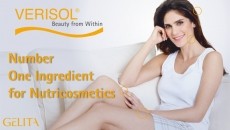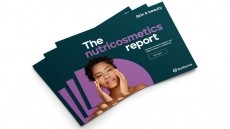Seppic study suggests phytoceramides support skin health in menopause

The researchers in the randomized double-blind placebo controlled clinical trial observed significant results in a subgroup of 31 menopausal women in as little as two weeks and at a low dose of 30 mg/d of the wheat polar lipid complex.
Findings indicated that Ceramosides led to a 19% increase in skin moisturization and an 18% improvement in skin elasticity after 56 days compared to a placebo. Volunteers in the study also reported positive effects on skin roughness and skin smoothness.
“Menopause brings unique challenges to women's physical and emotional well-being," said Alice Barbier, active ingredients product manager, nutrition activity at Seppic. "Particularly, hormonal changes experienced during menopause can lead to reduced skin thickness, loss of elasticity, increased dryness and vulnerability to various skin problems. With the growing demand for nutricosmetics solutions and the trend towards ceramides, wheat phytoceramides represent a natural and effective solution supported by strong scientific evidence.”
Menopause and skin health
The number of women over the age of 50 is expected to increase by 67.5% worldwide, growing from 985 million in 2020 to 1.65 billion in 2050 (Grand View Research, menopause market report November 2023), with women spending up to a third of their lives in post-menopause.
More than 40 different symptoms and signs of menopause and post-menopause have been identified, ranging from hot flushes and mood swings to decreased libido, hair and skin issues, and even depression.
This biological process is characterized by a decline in hormone levels, particularly estrogen, which plays a crucial role in maintaining skin health.
The collagen levels on the skin decrease rapidly in early menopause, with an average reduction of 30% in the first five years and an additional decrease of 2% per year over the next 15 years. Additionally, menopausal skin tends to become more fragile, making it more susceptible to damage and irritation.
Ceramides account for 50% of the lipids in the outer layer (stratum corneum matrix) and are key players in helping to maintain a good level of skin hydration while protecting the skin from aggression. However, hormonal changes induced by menopause have a direct impact on skin ceramides and affect their production, causing itching, dryness and wrinkles.
Latest evidence
The 56 day study, published in the Journal of Cosmetic Dermatology, included 72 participants randomized into two treated groups—WPLC oil (WPLC-O) or WPLC powder (WPLC-P)—and a placebo group.
Oral supplementation consisted of 70 mg/day of WPLC-O or 30 mg/day of WPLC-P, providing the same amount of sphingolipids and digalactosyl diglycerides (DGDG).
Assessments were carried out on days 0 (D0), 14 (D14), 28 (D28) and 56 (D56). An additional assessment was carried out on day 112 —56 days after the end of oral supplementation (D56 post).
To avoid any possible interference of cosmetics, subjects were provided with a neutral cosmetic cream (deprived of any cosmetic claim). Its use (morning and night) started five days before D0 and throughout the study.
At each visit, the following efficacy endpoints were evaluated: skin moisturization of the cheek using a CM 825 Corneometer; transepidermal water loss (TEWL) using Tewameter TM 300; skin elasticity of the cheek measured by an MPA 580 Cutometer; skin profilometry of crow's feet assessed using Primos CR; and at D0 and D56 tape stripping for lipidomic analysis using Corneofix.
Participants also filled out a 12-item questionnaire about product acceptability and effects.
While no significant variation was observed over time in the placebo group in the assessed parameters, the supplemented groups saw improvements in skin moisturization, TEWL, skin elasticity, skin smoothness and roughness, and wrinkle depth.
Focusing on the postmenopausal subpopulation of subjects, the effects of supplementation were similar to that in the total group.
Improved skin conditions were not maintained three months after the end of dietary supplementation, which the researchers said confirm that the effects can directly be attributed to the supplement.
“These results highlight the nutricosmetic potential of WPLC as an ingredient improving skin hydration and aging signs, even if further studies will be necessary to elucidate the exact mode of action associated with the clinical benefits of WPLC,” the study concluded.
Source: Journal of Cosmetic Dermatology
doi: 10.1111/jocd.16130
“Dietary supplementation with a wheat polar lipid complex improves skin conditions in women with dry skin and mild-to-moderate skin aging”
Authors: C. Kern et al.











